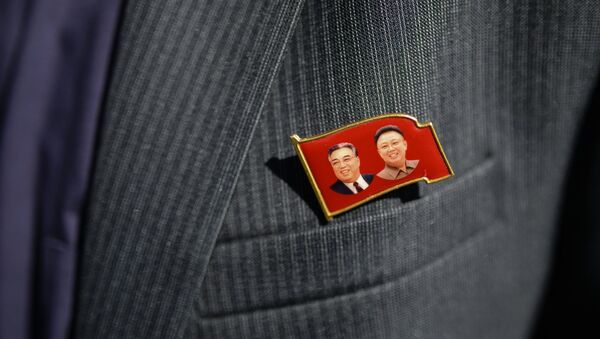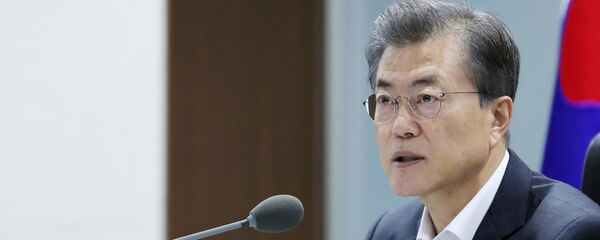MOSCOW (Sputnik) — The talks took place in the border "truce village" of Panmunjom, where the 1953 Korean Armistice Agreement was signed, and became the first high-level dialogue to take place between the two sides in over two years. As result of Tuesday's negotiations, officials from North and South Korea have agreed to hold military negotiations to defuse the border issue, reopen a military hotline in the Yellow Sea District and activate exchanges in diverse areas. North Korea noted that it would not discuss its nuclear weapons in coming talks with the South because they were targeting the United States only. The negotiations have also resulted in the decision of North Korea to send its athletes to the Winter Olympic Games in South Korea’s Pyeongchang.
Bilateral talks won't lead to reunification
On Sunday, North Korea's state news agency KCNA reported that leader Kim Jong Un addressed the nation with a New Year’s speech ahead of the bilateral talks, in which he said that it was time for an end to the rising tensions between North and South Korea in order to improve bilateral relations and begin reunification.
"It is not worth stirring up the past and recalling the specifics of relations with Seoul. Instead of this, relations between the North and South must be improved… It is not only about the normalization of the inter-Korean relations, but about the reconciliation of the nation and its free-will unification," KCNA said.
"Unification is a very long process and highly unlikely; this is more like achieving a detente between North and South… Again, this is really about tension reduction and trust building at this stage, not unification per se," Haggard said.
Pamela Kennedy, research associate with the East Asia Program at the Stimson Center, a think tank based in Washington, DC, stated furthermore that talks could be used by North Korea to negotiate aid from the South, rather than for seeking reunification.
"The talks will likely not help reunification efforts. The North has entered talks with South Korea at various levels a number of times before, usually seeking assistance or trying to weaken multilateral efforts to deal with the Kim regime (such as the defunct Six Party Talks). In a bilateral setting, North Korea can better negotiate for monetary or humanitarian aid. Rather than any serious discussion of reunification processes (and what a reunified Peninsula would look like, and under what government), the talks will focus on more achievable and urgent matters like the Olympics and aid," Kennedy said.
At Tuesday's talks, the North said that it would send a delegation to the Pyeongchang Winter Olympics, including its two figure skaters — Ryom Tae Ok and Kim Ju Suk — who are the only two North Korean athletes to have qualified for the Games. Meanwhile, the South proposed that North Korean athletes march with South Korean athletes during the opening and closing ceremonies. According to the International Olympic Committee, although the North Korean National Olympic Committee did not meet the October 30 deadline to accept the figure skaters’ spots, a final decision on their participation has not yet been made by the organization.
Obstacles to reunification
The bilateral Korea talks are a way to release the tensions that have been building since the last talks in 2015, and that would be needed to be alleviated in order for reunification to be considered by both sides, but other weighty obstacles still remain before this becomes a real possibility, experts said.
In 2017, tensions escalated over advancements in North Korea’s nuclear and long-range missile technology. In late November, North Korea successfully tested its latest intercontinental ballistic missile (ICBM), known as the Hwasong-15. In July, North Korea launched two ICBMs.
Haggard stated that at this stage the two countries are likely to make small steps that could begin to bring both sides to the negotiating table about reunification.
"Small gestures like family reunions or humanitarian aid could be opening points for the conversation," Haggard said.
At the bilateral talks, according to local media, South Korea invited the North to, with the help of local Red Cross societies, hold meetings of relatives separated as a result of the nation's split on the Lunar New Year (February 15).
The reunion of families, according to the policy released by South Korea’s Ministry of Unification, is one of the policy tasks to be resolved before unification can take place.
Another indication that South Korea would be willing to engage in similar gestures of goodwill is that, according to Yonhap news agency, Noh Kyu-duk, the South Korean Foreign Ministry spokesman, said on Tuesday that Seoul would consider the possibility of weakening sanctions against North Korea while the country participates in the 2018 Winter Olympics.
"North Korea’s first requirement would be maintenance of control over its nuclear and chemical weapons programs; second would be the breaking of the US-ROK alliance and the withdrawal of American troops from the Peninsula. North Korea would also need reassurance of the survival of the Kim regime’s top stakeholders – the Kim family, the elites, the top levels of the security apparatus and government – to the extent of maintaining their lifestyles if not continuation of political influence post-reunification," Kennedy said.
The international community has so far responded negatively to the way in which North Korea uses its nuclear weapons program and in contrast to allowing it to control it, has instead urged for its shutdown. In July, following a set of ballistic missile tests, the United Nations Security Council responded with a unanimous vote to impose new economic sanctions on North Korea – the most stringent yet – which cut at least one-third of the country’s annual export revenue. Russia and China have advocated for a "double freeze" solution, which would entail North Korea halting its nuclear and missile programs. Although the United States has not supported this initiative, it too has been critical of North Korea’s nuclear program.
Kennedy also stated that there would be a further condition that North Korea would likely have for reunification, namely incorporating South Korea into itself.
"I think it is also very likely that North Korea would want to be the surviving state after the merger, rather than being subsumed into South Korea. But South Korea would not agree to this, nor would it be practical given how large South Korea’s economy is in comparison to the North’s, so it is another major obstacle to reunification," Kennedy said.
US aid offer to improve relations could be counterproductive
Before reunification is considered by both North Korea and South Korea, bilateral relations would have to be improved. US President Donald Trump expressed his hope on Saturday that the United States would be able to involve itself in the relations between Seoul and Pyongyang once they had progressed beyond the current talks.
"I would love to see them take it beyond the Olympics… And at the appropriate time, we'll get involved," Trump said at a press conference at the Camp David presidential retreat, as broadcast by CBS News.
However, previously Trump expressed skepticism at the prospect of talks between the two countries. In a message posted on his official Twitter account, the US leader wrote that it would be difficult to tell whether the bilateral talks were good news, referring to Kim as "Rocket man."
"Rocket man now wants to talk to South Korea for first time. Perhaps that is good news, perhaps not — we will see!" Trump wrote.
"US support of the South-North talks could have a positive impact if South Koreans see the support as an act of goodwill, that the US understands the concerns and interests of South Koreans regarding North Korea… But the tendency of the US president to insult North Korea and Kim Jong-un could potentially derail talks as well," Kennedy said.
Haggard says that the United States should not alleviate its pressure on North Korea, despite Trump’s wish to participate in Korean bilateral relations.
"Trump saying he is willing to engage is a good sign, but pressure on North Korea should not be relaxed; all parties — including Russia and China — should stick to their commitments under the United Nations Security Council resolutions, and US should lower the temperature with respect to comments on the use of force," Haggard said.
White House press secretary Sarah Huckabee Sanders confirmed that the United States would not be easing its pressure on North Korea during a regular press briefing on January 3.
"Our policy with North Korea has not changed. We’re fully committed to continuing to apply maximum pressure and working with all of our partners in the region, including South Korea, who we have a better relationship with now than ever before," Sanders said.






